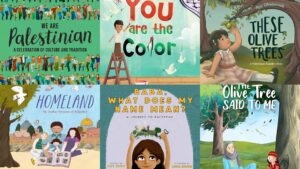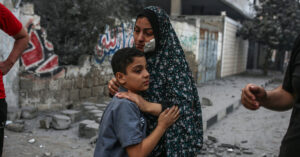In times of overwhelming adversity, like the plight of Palestinians, every act of solidarity matters. Inspired by the sparrow’s tale from Prophet Ibrahim’s story, we teach our children the power of standing up against oppression.
“Baba, Why Do We Protest for Palestine?” – A Guide for Muslim Parents

In a world where news of conflict and injustice frequently reaches our homes, the question of how to involve and educate our children on these matters is a pressing concern for Muslim parents. The struggle of Palestinians under occupation is a topic that resonates deeply within the Muslim community, stirring a mix of sorrow, anger, and a strong desire for action. Explaining this to our children is not about exposing them to the horrors of the world prematurely but about instilling values of empathy, justice, and the importance of standing up against oppression.
The Story of the Sparrow
The poignant narrative of the sparrow during Prophet Ibrahim’s (AS) trial by fire is not found in the Quran or Hadith but in the rich tapestry of Islamic storytelling. This tale showcases a tiny bird that, faced with a towering inferno and insurmountable odds, chose to act in defense of a prophet of God.
The sparrow’s repeated trips to the river to fetch water, a seemingly futile endeavor, symbolize an unwavering resolve and a moral compass that compels action in the face of injustice.
The Message for Our Children
By sharing this story with our children, we teach them that no effort is wasted and that the value of an action is not always in its immediate result but in the intention and courage behind it. When we march in protests for Palestine, every chant for freedom, every step we take, joins a larger global movement demanding change and accountability.
It is a collective assertion that the plight of Palestinians has not gone unnoticed and that the world cares.
The Reality of Protests
Protesting is a fundamental right and a powerful way to express solidarity. However, it comes with its own set of risks, especially when tensions are high, and opposing views clash in public spaces. The recent surge in protests for Palestine has been a testament to the strength of community spirit but has also highlighted the need for vigilance and safety, particularly in cities with a history of political volatility.
Ensuring Safety
The decision to involve children in such protests must be weighed carefully against the potential dangers. As parents, our first duty is to protect our children. We must evaluate the atmosphere of a protest and consider the presence of law enforcement, the likelihood of counter-protests, and the general mood of the event before deciding to bring our young ones along.
Other Forms of Solidarity
There are numerous ways to support Palestine beyond physical protests. We can engage in educational activities, such as hosting community talks, participating in fundraising efforts for humanitarian aid, or using social media to spread awareness.
We can also encourage our children to express their thoughts and support through art, writing, or discussion, fostering a sense of agency and involvement.
The Importance of Dialogue
Open, age-appropriate dialogue with our children about Palestine is critical. It should not be a monologue of despair but a conversation about hope, resistance, and the power of collective action. By explaining why we raise our voices, why we donate, why we educate ourselves and others, we pass on a legacy of activism rooted in Islamic principles and universal human rights.
The story of the sparrow is a metaphor for our efforts as part of the ummah. It is about doing whatever we can, however small, to contribute to a just cause. As we impart this wisdom to our children, we are also teaching them about history, about the virtues of Prophet Ibrahim (AS), and about the power of collective action. Whether it’s through protest, prayer, or education, we are laying the foundation for a future generation that is informed, compassionate, and courageous. As we navigate the complexities of such a profound struggle, we find strength in our faith, in our community, and in the knowledge that, like the sparrow, our collective efforts will be recorded in the annals of time as a testament to our unwavering commitment to justice.


